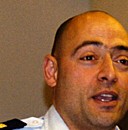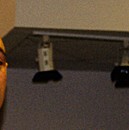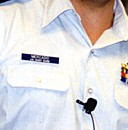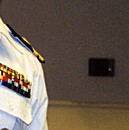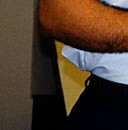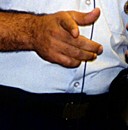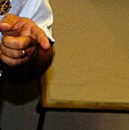General Board of Global Ministries
![]()
UM Information
UM
Reporter
![]()
Florida Southern College
![]()
Bethune
Cookman College
![]()
FL UM Children's Home
![]()
|
|
Pastor leads county in training on diversity during disaster |
|||||||||
|
|||||||||
Photo by Michael Wach |
|||||||||
| Coast Guard Lt. Juan Mercado, a native of Puerto Rico, tells participants at a recent diversity training event that the Coast Guard had to change how it recruits and assigns servicemen because of changing demographics in the United States. "If you're a Puerto Rican and you're drowning, you want to be saved by someone who speaks Spanish, who can communicate with you," he said. |
| By Michael Wacht COCOA — The United States Coast Guard, the American Red Cross and the United Methodist Committee on Relief worked under the direction of the Rev. David Harris April 6 and 7 to train people in Brevard County on understanding and working with diversity in disaster response. Harris is pastor of Mims United Methodist Church in Mims and chairman of the Brevard County Voluntary Organizations Active in Disaster (VOAD). The training, titled "One Goal – Different Talents," was designed to help residents and disaster relief volunteers and professionals recognize and discuss differences in ethnicity, language, age, gender and ability that can hinder their efforts in times of crisis. "People are what it’s [disaster response] all about," he said. "If we can’t get past our own feelings and thoughts, we’ve failed. It doesn’t matter how many people we help, if we can’t get past our own issues, it’s not a help." The three-hour seminar was held in two locations on consecutive days. Lt. Juan Mercado, an instructor with the Coast Guard’s Defense Equal Opportunity Management Institute, led participants through a series of discussions beginning with defining diversity. "Diversity is the mix of similar and different qualities that make us all unique and how we empower people to use their differences in the workplace," Mercado said. "When you get all the resources together, you’ll be surprised at how diverse an organization is, even though most people just focus on ethnicity." He also asked participants to discuss their exposure to diversity and issues they have faced. "Things are changing and we have to change with the time in order to do our jobs better," Mercado said. "The purpose is to create a bridge for effective communications…and make sure there are no barriers there. Building bridges and removing barriers, that’s a very powerful combination." Jan Wiegold Bryant, executive director of the Brevard County Chapter of the American Red Cross, told participants that overcoming differences was a three-step process. The first step is to overcome personal thoughts and attitudes. "It’s got to start with you," she said. "What are the things I can do to accept others’ differences?" Once people deal with personal issues, Bryant said they can begin a dialogue, which she defined as an open discussion about feelings that does not require agreement or consensus, within their business or group. The third step is to take that dialogue beyond a small group into the larger organization or society. Bill Rhan, the Florida Conference and Southeastern Jurisdiction’s disaster relief coordinator, presented information on shelter management and encouraged participants not to deal with disaster victims as cases, but as people. He demonstrated some attitudes he has seen expressed in disaster shelters toward youth, seniors and people who have disabilities, describing them as offensive. "We’re all going to offend each other sometimes," Rhan said. "It’s not how we hold on to offenses that’s important, though. It’s how we build on them and grow." Harris said he was pleased with the training, despite a lower-than-expected turnout. "It makes us think and reflect on our own attitudes and realize we’re not as good at cultural diversity as we thought we were," he said. Richard LaCroix, the chief of operations for Central Florida Search and Rescue, said he learned a lot at the event, despite many years of experience in disaster response. "I didn’t know there was that much difference," he said. "I was a volunteer firefighter, and I knew there was some, but not like this. It’s nice to know what to expect and how to deal with it." Top
of this page |


